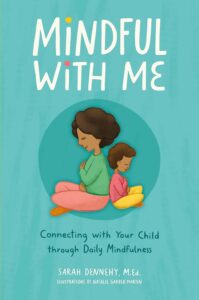 with charming illustrations throughout by Natalie Garber Martin.
with charming illustrations throughout by Natalie Garber Martin.
My middle child has a problem: sometimes when he gets frustrated, even over the most seemingly innocuous of things, he’ll have a crying, screaming, snot-filled emotional meltdown in absolutely no proportion to the triggering incident. This doesn’t happen to either of my other children, who tend to look on in bemusement whenever Joseph has one of his “big baby” moments, as they call it (yes, I know it’s not very kind, but sometimes it make Joseph laugh and feel less rageful. Heaven knows, the other kids could use a laugh in the face of such intensity, too!) And since it can be hard to figure out what exactly will set him off or when, I’m always on the lookout for solutions that will help him regulate his emotions and regain his composure in a healthy manner.
As a generally mindful parent who’s big on self-awareness (and wishes she had way more time to do yoga,) I usually try to get him to deal with these big emotions by engaging in some very simple breathwork. If you’ve ever watched Daniel Tiger, you’ll know exactly what I mean when I say that we do the “When you feel so mad that you want to roar, take a deep breath and count to four” song. But that doesn’t always work, so when this book landed in my inbox, I knew I had to prioritize reading it, not only for review here but to see if I could glean any useful tips in working specifically with my middle child. If I got anything I could also use with my other kids, that would definitely be a bonus.
There’s a lot of valuable information and advice in this slender volume that’s just as much an activity workbook as it is an explanation on what mindfulness is, how to practice it, and how it benefits both caretaker and child. Even as a person who loves breathwork — I was literally doing every sedentary breathing exercise along with the book as I read — I learned several new techniques to add to my repertoire. The section devoted to breathing, however, is actually Chapter 3 in the book, as Sarah Dennehy leads readers slowly and intentionally through the many steps of creating a mindfulness practice for your child and yourself. She makes it very clear that, as the caretaker, the adult reader must be an active participant in teaching their child(ren) how to be mindful, and that co-regulation is an integral part of this journey as the caretaker models healthy behaviors for their kids. Her process starts with creating a Connection Corner in the home where caretaker and child can start working on co-regulation together, before eventually taking mindfulness on the road where it can be exercised when most needed. Not all triggers are going to happen at home, after all, and it’s good to be prepared to self-regulate whenever and wherever you need it. Caretakers who’ve had therapy may also recognize some of the tips here as being coping strategies for anxiety and other big, overwhelming emotions with more complicated, grown-up names (and will likely appreciate the utility of having these strategies available from childhood onward too.)
Of course, the voice of the judgmental Asian parent in my head spent a lot of this book arguing with me about whether all of this is even necessary. While I acknowledge her concerns, I also know that, growing up, I would have much rather had the kind of parent who cares about their kids’ interior lives and wants to give them real tools to help face emotional challenges, instead of leaving them to try and fail and try again on their own. I get to be that parent for my kids, and while not all of the exercises here are things that my family and I can do — an obstacle Ms Dennehy acknowledges while stressing that her book is a toolbox not a regimen — there are certainly enough things here that I want to try out with my kids that will hopefully help deepen our understanding of both mindfulness and of each other. I want my kids to feel like they can always trust me to listen to them and care, and I want to help them continue to grow to be well-adjusted adults who are kind and considerate to others as well as to themselves. That’s pretty much my entire parenting philosophy, and I’m so glad to find a book that’s more than willing to equip me with the tools I need to achieve that aim.
Mindful With Me: Connecting With Your Child Through Daily Mindfulness by Sarah Dennehy was published September 3 2024 by Collective Book Studio and is available from all good booksellers, including
